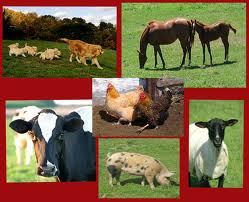Food security and poverty alleviation in Africa: The livestock perspective
Lazarus Sauti
The livestock sector’s contribution to Africa’s economic growth and
sustained development remains to be fully exploited.
Inability to comply with international sanitary and phito-sanitary standard
requirements have made it challenging for some African countries to also be a
net exporter of many live animals and livestock products internationally.
Increased demands for livestock products resulting from rapidly growing economies,
population growth and changing patterns of food consumption are creating
opportunities to reduce poverty through livestock production and marketing.
It is estimated that livestock production and marketing are currently
essential to the livelihoods of more than one billion poor people in Africa and
Asia: one-seventh of humanity.
The Director General of the National Biotechnology Development Agency in
Nigeria, Professor Solomon Bamidele, is of the view that the livestock sub
sector is a critical component of Africa’s agriculture.
He comments, “The livestock sub sector is an important and integral
component of Africa’s agriculture and is a major source of household wealth,
job creation and food security.”
Bamidele also encouraged African countries to embrace reproductive
biotechnology as it allows for rapid changes in the genetics and food and fiber
producing animals.
“Biotechnology techniques which can be utilised, include the use of DNA
markers to identify important economical traits, sexing of semen and embryos,
in vitro production of embryos, improved vaccine in animal production, utilisation
of growth hormones production and cloning are the breakthroughs in
biotechnology which proffer solution to the depleting production of beef dairy
and poultry,” he said.
The application of biotechnology techniques in animal agriculture has the
capacity to unleash the potentials of the livestock industry to adequately
support food security and poverty alleviation.
To achieve this, there is need to assess the status of biotechnology
development as it affects the livestock industry in Africa; engage in strategic
capacity and infrastructural development in the short, medium and long term;
engage in advocacy and proper coordination of biotechnology activities in the continent;
build synergies and take advantage of achievements in other sectors; engage in
selective adoption of biotechnologies and create awareness.
This means relevant stakeholders (government and private agencies,
including research and other stakeholders) should join hands in contributing to
biotechnology development, particularly as it affects the livestock industry.
More so, African countries should adopt innovations that will promote
agricultural development to ensure food security, employment generation, youths
empowerment and upliftment of the living standards of its citizenry.
Nigerian Minister of Science and Technology, Professor Ita Ewa believes that
the benefits of biotechnologies in livestock are numerous.
He said: “The benefits of biotechnologies in livestock take in enhanced
nutritional content of food for human consumption; a more abundant, cheaper and
varied food supply; agricultural land - use savings; development of new
inexpensive remedies for animal and human as well as ensure environmental
sustainability thereby helping to alleviate poverty and hunger.”
Livestock contribute to food supply by converting low-value materials,
inedible or unpalatable for people, into milk, meat, and eggs; livestock also
decrease food supply by competing with people for food, especially grains fed
to pigs and poultry.
Currently, livestock supply 13 percent of energy to the world’s diet but
consume one-half the world’s production of grains to do so.
An article in Animal Frontiers, the review magazine of animal agriculture,
sums it in this way: “Livestock have the potential to be transformative: by
enhancing food and nutrition security, and providing income to pay for
education and other needs, livestock can enable poor children to develop into
healthy, well-educated, productive adults.
“The challenge is how to manage complex trade-offs to enable livestock’s
positive impacts to be realised while minimising and mitigating negative ones,
including threats to the health of people and the environment.”

Comments
Post a Comment